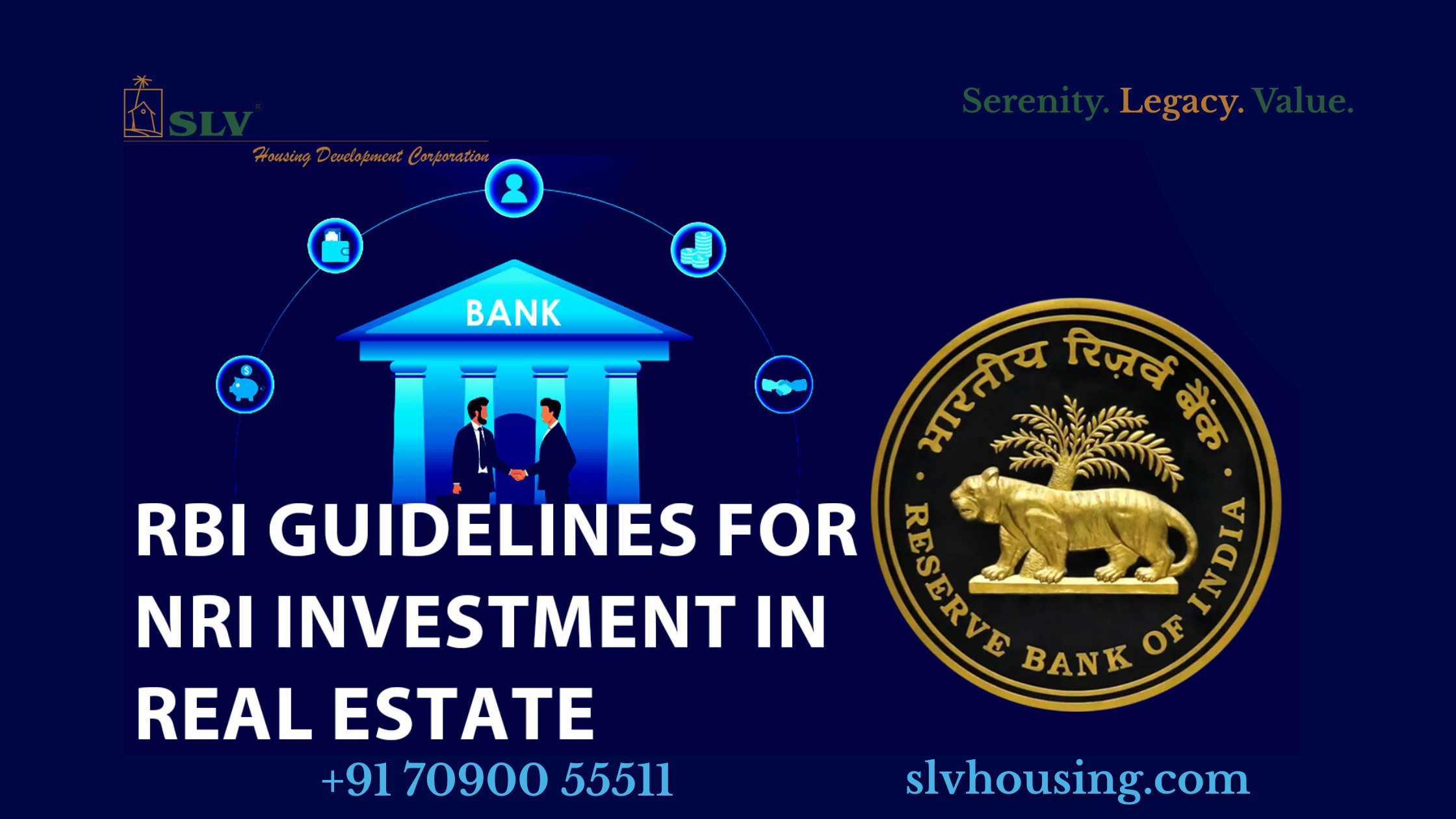For Non-Resident Indians (NRIs), buying property in India isn’t just an emotional decision — it’s a strategic financial move that strengthens family connections while building long-term wealth. However, every NRI property transaction must comply with the Reserve Bank of India (RBI) and Foreign Exchange Management Act (FEMA) guidelines.
This article explains the key RBI rules, legal requirements, and compliance steps NRIs need to know before investing in residential or commercial properties in India.
Who Qualifies as an NRI
Under FEMA, an NRI (Non-Resident Indian) is an Indian citizen who resides outside India for employment, business, or any other purpose that indicates an indefinite stay abroad. NRIs are permitted to invest in residential and commercial real estate in India — with a few restrictions.
What Type of Property Can NRIs Buy
NRIs can legally purchase residential apartments, villa plots, and commercial spaces in India. However, they cannot buy agricultural land, plantation property, or farmhouses unless acquired through inheritance or as a gift.
Most NRIs prefer BMRDA-approved villa plots or gated communities in Bengaluru, as they ensure legal compliance, appreciation, and clear ownership.
RBI Rules for Property Purchase
As per RBI’s Foreign Exchange Management (Acquisition and Transfer of Immovable Property in India) Regulations, 2018, NRIs can buy property in India without seeking special permission — except in certain restricted cases.
- Payments must be made in Indian Rupees through banking channels.
- The investment should come from NRE, NRO, or FCNR accounts.
- Funds sent via inward remittance from abroad are fully permitted.
- NRIs can freely purchase any number of residential or commercial properties in India.
- No prior approval from RBI is required unless the buyer is from a restricted country such as Pakistan, Bangladesh, Sri Lanka, Afghanistan, Iran, or China.
Repatriation of Sale Proceeds
Repatriation allows NRIs to transfer money from India to their overseas account after selling a property. As per RBI norms:
- Repatriation is allowed only for properties purchased using funds from NRE or FCNR accounts.
- The amount repatriated cannot exceed the original investment value.
- NRIs can repatriate proceeds of up to two residential properties per financial year.
- The property must be held for a minimum of ten years before full repatriation in most cases.
Maintaining proper documentation and proof of inward remittance simplifies the repatriation process and ensures full compliance.
Joint Ownership and Inheritance Rules
NRIs can jointly purchase property with another NRI or an Indian resident. However, both parties must be legally eligible under FEMA to invest.
Property inherited from an Indian citizen does not require RBI permission. If the inherited property is sold later, proceeds can be repatriated according to FEMA limits, subject to tax compliance.
Home Loan Eligibility for NRIs
NRIs can easily avail home loans from Indian banks and housing finance institutions, provided they meet KYC and income verification criteria. The repayment can be done through:
- NRE / NRO / FCNR accounts
- Rent received from the property
- Salary earned in India
Leading banks such as SBI, HDFC, and ICICI offer customized home loan solutions for NRIs investing in Indian real estate.
Taxation and TDS Rules
Every NRI property transaction in India is subject to taxation under Indian law.
- On Purchase: When an NRI buys property from an Indian resident, TDS of 1% applies if the value exceeds ₹50 lakh.
- On Sale: Capital gains tax applies — 20% on long-term gains (if the property is held for over two years).
- Rental Income: Income earned from renting the property is taxable in India, but deductions can be claimed for property taxes, interest, and maintenance.
- DTAA Advantage: India has signed Double Taxation Avoidance Agreements (DTAA) with several countries, allowing NRIs to claim credit for taxes paid in India.
Essential Legal Documentation
Before finalizing any purchase, NRIs must ensure that the property is legally clean and fully approved. Key documents include:
- Title deed and sale agreement
- Encumbrance certificate confirming no pending legal claims
- BMRDA / BDA / BBMP approvals
- Tax paid receipts and occupancy certificate
Working with a trusted developer like SLV Housing Development Corporation ensures full legal transparency, verified approvals, and peace of mind for every buyer.
Key RBI and FEMA Compliance Highlights
In summary, here are the most critical RBI and FEMA norms NRIs must follow:
- Only residential and commercial properties can be purchased.
- No agricultural or plantation land purchases are allowed.
- Payments must be made via authorized banking channels in Indian Rupees.
- NRE/NRO/FCNR accounts are valid for remittances and loan repayments.
- Repatriation is allowed for up to two properties per financial year.
- RBI permission is required only for buyers from restricted countries.
Adhering to these ensures your investment remains fully compliant, safe, and legally sound.
Why Choose BMRDA-Approved Developers
Legal clarity is one of the most important aspects of NRI investment. Choosing BMRDA-approved projects not only secures your ownership rights but also simplifies financing, registration, and resale in the future.
At SLV Housing Development Corporation, every project — from Gokul Gardens to Sri Krishna Villas — is built on transparency, trust, and compliance with RBI and FEMA norms.
Conclusion
For NRIs, buying property in India is both a financial and emotional investment. By understanding the RBI rules, legal requirements, and documentation process, you can ensure a smooth, compliant, and profitable real estate journey.
Whether you wish to build your dream villa or invest in long-term appreciation, always choose approved plots and reputed developers who value your trust and adhere to every regulation.
📞 Contact SLV Housing Development Corporation
Phone: +91 70900 55511
Email: marketing@slvhousing.co.in
Website: www.slvhousing.com
Enquire Now: Click Here
✨ Serenity. Legacy. Value.
This is more than our brand line — it’s our promise:
- Serenity: Peaceful surroundings and legally secure environments.
- Legacy: Properties built to appreciate and endure for generations.
- Value: Developments that balance lifestyle enrichment with investment growth.
👉 Invest with confidence — secure your NRI property in Bengaluru today with SLV Housing Development Corporation.



